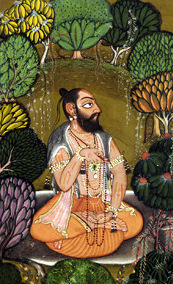
Table of Contents (The Complete Mahabharata in Simple English)
Previous Post: The Battle Between Danavas and Devas After Samudra Manthan
| Note: In the previous post, we read about the battle between the devas and the asuras after the Churning of the Ocean, and how Nara and Narayana defeated the asuras. In today’s post, we will return to the story of Vinata and Kadru, and learn about the bet they wagered that eventually led to Vinata becoming Kadru’s slave. |
After narrating the story of Samudra Manthan, Sauti said to the ascetics in Naimisha Forest, “I have told you the whole story of how the amrit was obtained and when the celestial horse, Uchchaihsravas, emerged from the ocean.”
After that, Sauti returned to the earlier story of Vinata and Kadru. After speaking about the celestial horse, Kadru said to Vinata, “Tell me, sister, what do you think is the color of Uchchaihsravas?”
Vinata answered, “The celestial horse is most certainly white in color. What do you think, sister? Let’s place a bet on its color.”
Kadru replied, “In that case, I think its tail is black in colot. O beautiful sister, let us place a bet that the person who loses will have to serve the winner as a slave.”
After agreeing on the terms of the bet, Vinata and Kadru returned home and decided to visit Uchchaihsravas, the next day, to verify its color.
Determined to win the bet by deceit, Kadru commanded her thousand snake sons to transform themselves into black hair and quickly cover Uchchaihsravas’ tail so it would appear black. Her sons, however, refused to follow her order. Angered by their refusal, Kadru cursed her thousand sons with the following words, “A wise king called Janamejaya, of Pandava race, will perform a snake sacrifice one day, and, in that sacrifice, the fire god, Agni, will consume all of you!”
Lord Brahma heard these cruel words that Kadru had uttered to her sons, but he knew that these words were influenced by destiny. The population of snakes had increased a lot and had created an imbalance in the ecosystem. The snakes were strong and poisonous and they were always bent upon biting and persecuting other creatures.
Lord Brahma, driven by compassion for the suffering creatures, did not intervene in this issue. The snakes had inflicted immense harm to other creatures and something had to be done to stop their suffering.
When the other gods discussed this matter, they also agreed that fate always punished creatures who harmed others. Therefore, they supported Kadru’s curse because they considered it in line with fate.
Even though the destiny of the snakes was sealed, Lord Brahma felt sorry for their father, Sage Kasyapa. Therefore, Brahma called the noble sage to his abode and explained that his snake children had been cursed by their mother and that he should not grieve about it because it was preordained by destiny. After comforting Sage Kasyapa, Lord Brahma taught him the science of neutralizing snake poison.
| Note: In the next post, we will read about Vinata and Kadru going to check the color of Uchchaihsravas’ tail. |
Table of Contents (The Complete Mahabharata in Simple English)
Next Post: Vinata and Kadru cross the great ocean to see Uchchaihsravas


